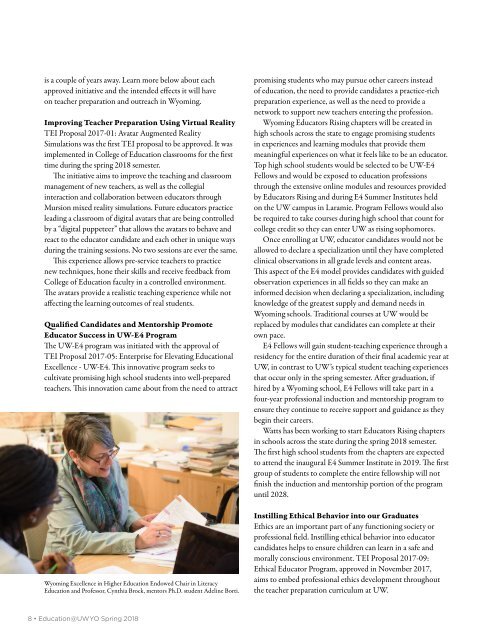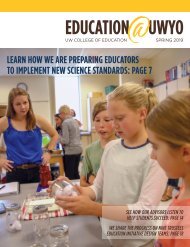University of Wyoming College of Education Spring 2018
Magazine for the University of Wyoming College of Education.
Magazine for the University of Wyoming College of Education.
You also want an ePaper? Increase the reach of your titles
YUMPU automatically turns print PDFs into web optimized ePapers that Google loves.
is a couple <strong>of</strong> years away. Learn more below about each<br />
approved initiative and the intended effects it will have<br />
on teacher preparation and outreach in <strong>Wyoming</strong>.<br />
Improving Teacher Preparation Using Virtual Reality<br />
TEI Proposal 2017-01: Avatar Augmented Reality<br />
Simulations was the first TEI proposal to be approved. It was<br />
implemented in <strong>College</strong> <strong>of</strong> <strong>Education</strong> classrooms for the first<br />
time during the spring <strong>2018</strong> semester.<br />
The initiative aims to improve the teaching and classroom<br />
management <strong>of</strong> new teachers, as well as the collegial<br />
interaction and collaboration between educators through<br />
Mursion mixed reality simulations. Future educators practice<br />
leading a classroom <strong>of</strong> digital avatars that are being controlled<br />
by a “digital puppeteer” that allows the avatars to behave and<br />
react to the educator candidate and each other in unique ways<br />
during the training sessions. No two sessions are ever the same.<br />
This experience allows pre-service teachers to practice<br />
new techniques, hone their skills and receive feedback from<br />
<strong>College</strong> <strong>of</strong> <strong>Education</strong> faculty in a controlled environment.<br />
The avatars provide a realistic teaching experience while not<br />
affecting the learning outcomes <strong>of</strong> real students.<br />
Qualified Candidates and Mentorship Promote<br />
Educator Success in UW-E4 Program<br />
The UW-E4 program was initiated with the approval <strong>of</strong><br />
TEI Proposal 2017-05: Enterprise for Elevating <strong>Education</strong>al<br />
Excellence - UW-E4. This innovative program seeks to<br />
cultivate promising high school students into well-prepared<br />
teachers. This innovation came about from the need to attract<br />
<strong>Wyoming</strong> Excellence in Higher <strong>Education</strong> Endowed Chair in Literacy<br />
<strong>Education</strong> and Pr<strong>of</strong>essor, Cynthia Brock, mentors Ph.D. student Adeline Borti.<br />
promising students who may pursue other careers instead<br />
<strong>of</strong> education, the need to provide candidates a practice-rich<br />
preparation experience, as well as the need to provide a<br />
network to support new teachers entering the pr<strong>of</strong>ession.<br />
<strong>Wyoming</strong> Educators Rising chapters will be created in<br />
high schools across the state to engage promising students<br />
in experiences and learning modules that provide them<br />
meaningful experiences on what it feels like to be an educator.<br />
Top high school students would be selected to be UW-E4<br />
Fellows and would be exposed to education pr<strong>of</strong>essions<br />
through the extensive online modules and resources provided<br />
by Educators Rising and during E4 Summer Institutes held<br />
on the UW campus in Laramie. Program Fellows would also<br />
be required to take courses during high school that count for<br />
college credit so they can enter UW as rising sophomores.<br />
Once enrolling at UW, educator candidates would not be<br />
allowed to declare a specialization until they have completed<br />
clinical observations in all grade levels and content areas.<br />
This aspect <strong>of</strong> the E4 model provides candidates with guided<br />
observation experiences in all fields so they can make an<br />
informed decision when declaring a specialization, including<br />
knowledge <strong>of</strong> the greatest supply and demand needs in<br />
<strong>Wyoming</strong> schools. Traditional courses at UW would be<br />
replaced by modules that candidates can complete at their<br />
own pace.<br />
E4 Fellows will gain student-teaching experience through a<br />
residency for the entire duration <strong>of</strong> their final academic year at<br />
UW, in contrast to UW’s typical student teaching experiences<br />
that occur only in the spring semester. After graduation, if<br />
hired by a <strong>Wyoming</strong> school, E4 Fellows will take part in a<br />
four-year pr<strong>of</strong>essional induction and mentorship program to<br />
ensure they continue to receive support and guidance as they<br />
begin their careers.<br />
Watts has been working to start Educators Rising chapters<br />
in schools across the state during the spring <strong>2018</strong> semester.<br />
The first high school students from the chapters are expected<br />
to attend the inaugural E4 Summer Institute in 2019. The first<br />
group <strong>of</strong> students to complete the entire fellowship will not<br />
finish the induction and mentorship portion <strong>of</strong> the program<br />
until 2028.<br />
Instilling Ethical Behavior into our Graduates<br />
Ethics are an important part <strong>of</strong> any functioning society or<br />
pr<strong>of</strong>essional field. Instilling ethical behavior into educator<br />
candidates helps to ensure children can learn in a safe and<br />
morally conscious environment. TEI Proposal 2017-09:<br />
Ethical Educator Program, approved in November 2017,<br />
aims to embed pr<strong>of</strong>essional ethics development throughout<br />
the teacher preparation curriculum at UW.<br />
Pr<strong>of</strong>essor <strong>of</strong> Elementary & Early Childhood <strong>Education</strong>, Michelle Buchanan,<br />
works with a young student<br />
This approach will ingrain candidates with a sense <strong>of</strong> how<br />
to best mitigate risk when they are confronted with an ethical<br />
dilemma. Candidates gain a deeper understanding with this<br />
method in contrast to a model that includes only a single<br />
course in pr<strong>of</strong>essional ethics.<br />
The ethics strand in the curriculum will incorporate<br />
elements <strong>of</strong> the Model Code <strong>of</strong> Ethics for Educators,<br />
developed by the National Association <strong>of</strong> State Directors<br />
<strong>of</strong> Teacher <strong>Education</strong> and Certification.<br />
Pre-service teachers will be immersed with ethics through<br />
case studies embedded into coursework and by completing<br />
the ProEthica® program. This modular online training<br />
program presents real-life ethical challenges a teacher<br />
candidate must solve through videos, simulations and<br />
activities. Access to this program has been funded by TEI.<br />
Ethics will also be embedded into the student-teaching<br />
assessment pre-service teachers must undergo. Teacher<br />
candidates will be asked to reflect on the ethical dilemmas<br />
they experienced while student teaching and how they<br />
navigated those situations based on their training.<br />
Outcomes Data to Guide Innovation at UW <strong>College</strong><br />
<strong>of</strong> <strong>Education</strong><br />
Innovation should always be informed by valid, reliable,<br />
meaningful data. A recent national analysis showed that<br />
educator preparation programs lack sufficient data to inform<br />
improvements and innovation.<br />
The approval <strong>of</strong> TEI Proposal 2017-12: Common<br />
Indicator Set, put the wheels in motion for UW to help solve<br />
this problem by joining the Deans for Impact Common<br />
Indicators System, a national consortium <strong>of</strong> educator<br />
preparation programs which will collect and analyze data<br />
elements in order to drive innovation in the field.<br />
This innovation will allow the <strong>College</strong> <strong>of</strong> <strong>Education</strong> to<br />
guide its decisions on program improvement based on data<br />
that has been systematically gathered, analyzed and can be<br />
compared to other member institutions.<br />
The college will launch a search for a data scientist as part<br />
<strong>of</strong> a UW data science cluster hire. This new full-time position<br />
will oversee the implementation <strong>of</strong> the Common Indicators<br />
System and other assessments related to continuous program<br />
improvement and the implementation <strong>of</strong> approved TEI<br />
innovations. TEI will provide funding to support the work<br />
<strong>of</strong> the newly hired data scientist, including necessary any parttime<br />
personnel.<br />
Equipped with good data and the new data scientist, the<br />
college will be poised to make necessary improvements to<br />
programs in a timely manner in order to better serve the state<br />
<strong>of</strong> <strong>Wyoming</strong>. It will also allow for the continuous assessment<br />
<strong>of</strong> the value TEI innovations provide as they are implemented<br />
and integrated into the current programs.<br />
Pr<strong>of</strong>essional Development Options Improve Skills<br />
<strong>of</strong> Early Childhood Educators<br />
In <strong>Wyoming</strong>, it can be geographically difficult for pre-service<br />
early childhood educators to gain pr<strong>of</strong>essional experiences.<br />
It can also be equally as hard for seasoned pr<strong>of</strong>essionals in<br />
early childhood to participate in pr<strong>of</strong>essional development<br />
opportunities to expand their knowledge and skills. TEI<br />
Proposal 2017-08: <strong>Wyoming</strong> Early Childhood Outreach<br />
Network aims to expand the field placement options and<br />
pr<strong>of</strong>essional development opportunities for early childhood<br />
educators, in addition to providing an early childhood<br />
education undergraduate degree at UW.<br />
This innovation will create the <strong>Wyoming</strong> Early Childhood<br />
Outreach Network (WyECON) to act as an organizing<br />
body to provide high-quality field experience options for<br />
pre-service teachers and to make existing pr<strong>of</strong>essional<br />
development opportunities available to all early childhood<br />
educators, regardless <strong>of</strong> their geographic location. These<br />
opportunities will be conducted through a statewide network<br />
<strong>of</strong> community hubs where early childhood education<br />
pr<strong>of</strong>essionals will feel free to gain new techniques and openly<br />
discuss their needs and challenges with peers.<br />
The development <strong>of</strong> an early childhood undergraduate<br />
degree will be explored to provide a pathway for educators<br />
to earn a bachelor’s degree from the <strong>University</strong> <strong>of</strong> <strong>Wyoming</strong>.<br />
If this degree program is developed, WyECON participants<br />
would be able to complete pr<strong>of</strong>essional development modules<br />
to earn credit toward their degrees at UW.<br />
8 • <strong>Education</strong>@UWYO <strong>Spring</strong> <strong>2018</strong> <strong>Education</strong>@UWYO <strong>Spring</strong> <strong>2018</strong> • 9



